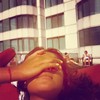Rais Bhuiyan is the sole survivor of Mark Stroman's infamous 9/11-inspired hate crime attack. All photos via Daily VICE
Advertisement
Advertisement
It took a little time. My shooter, Mark Stroman, he killed two innocent South Asians: one from Pakistan and one from India. And he shot me the face on September 21st. After he was arrested, he volunteered and told the local media that what he did what most Americans wanted to do but didn't have the guts. He claimed he was the true American patriot. He was full of ignorance and full of hate.
Bhuiyan speaks to VICE in Toronto.
Right. My upbringing and fate gave me the courage to forgive and run an international campaign to save his life. Because I suffered terribly. I mean, I lost vision in one eye. I lost a tooth, which was totally replaced. I lost my fiancee. I went through a lot of disaster, one after one, and there is no doubt that I suffered terribly, but I didn't see any value in him suffering as well. I saw him as a human being and I wanted to save his life because I forgave him. But after coming back from Mecca, from the religious pilgrimage, I realized it was not enough. Even though I forgave him, he was going to be executed. And by executing him, we would simply lose a human life without dealing with the root cause. I thought if he was given a chance, he might become a better human being and he might be able to contribute to society in a positive way. And my effort to save the life of Mark Stroman was based upon hope that the people can take a new narrative, can work to build a world based upon mutual respect and dignity and understanding. And I was totally convinced that I had to do the best I could to save his life, even though he tried to end mine.
Advertisement
I said, "Mark, you should know that I never hated you and I forgive you." And he said, "Rais, you know, thank you very much. What you've been doing is amazing. I never expected that from you." And then suddenly he said, "I love you, bro." And I couldn't hold my tears at that time. [I was thinking,] Why couldn't you have said the same thing ten years back instead of pulling the trigger when you saw I was terrified in the gas station? I was nervous. If you could have found me as a brother, as your brother at that day, you wouldn't be [on] death row.My eyes were full of tears. It was very emotional, it was very painful, and I couldn't hold the tears when he said, "I love you, bro." And then he said, "Rais, I have to go, they're calling me."The atmosphere after 9/11 was tense, it was full of hate, there was a lot of animosity towards brown people in general. But it felt like we were making progress in the last, you know, decade or so. It's hard not to feel right now like that progress has been undone with what's happened with the election. How does it feel right now in the US? Do you feel like we've taken a step backwards?
Well, there has been an indescribable amount of emotion, pain, dialogue, some violence and intense fear across the United States after the last week's presidential election. And regardless of, you know, a political revolution or view, the reaction and the after effects are real and dominant. I mean, during this very, very crucial, very difficult moment, [the] only one thing I can think of right now is that we must, stay kind, gentle and more merciful with everyone, and with ourselves as well. Because we don't want to live in a world full of hate, and ignorance, and violence, no matter who you are.
Advertisement
Well to be honest with you, as a human being, and since what happened to me in the past and what I'm seeing right now is happening in the world, I still, you know, I am afraid. But again, my hope kicks in right there. Yes, there is a fear. There is a lot of bigotry, [a] lot of discrimination taking place in our society, but that should not stop us [from moving] forward. Our dreams should be bigger than our fear. Our hope should be bigger than our fears. Otherwise we cannot move forward.What would you say to someone, someone like Mark now, who's feeling that anger and that hatred and thinking about acting?
Everywhere I go, I say one thing that, once you get to know them, you cannot hit them. There's a huge disconnect in our society and because of that, fear rules. I would say, to everyone, that please try to get to know the [someone] different from you. [G]et to know them, the way Mark found me as his brother and he said he loved me. There was a disconnect ten years back. If he'd have taken some initiative to know people like me, people from Middle East, or people different from him, he would not end up his life in death row.Your compassion is incredible given what you've been through and I think it's an amazing example for the millions of people who are on on both sides of the equation, in the US and the world over. So thank you.
Thank you very much. I think I give the credit to my parents. They taught me about mercy and forgiveness when I was a very young kid. And when I faced a harsh and difficult situation, after being shot, I was able to practice what I was taught. I think, as human being[s], we all are capable of practicing the same human qualities. It's just a matter of how we see things. I'm not a superhuman over here. I'm just a normal human being.Follow Amil on Twitter.
